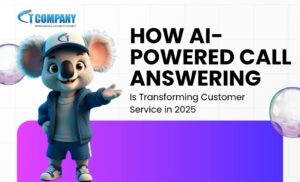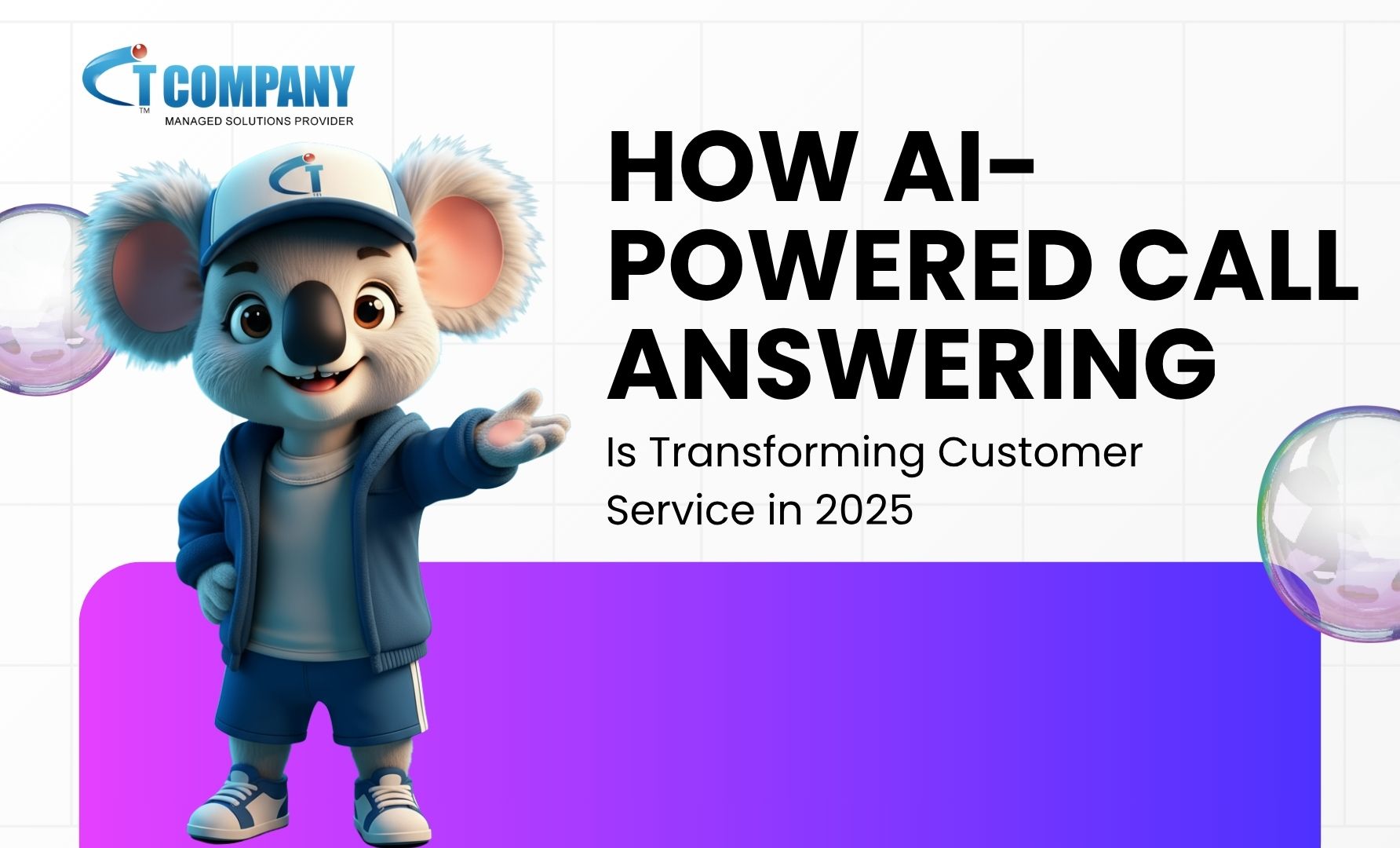Introduction
Customer expectations are evolving faster than ever. In today’s digital-first economy, customers want answers quickly, efficiently, and around the clock. Within the first seconds of a call, they expect clarity and helpfulness—no long hold times, no confusing menus, no transfers to the wrong department. Enter AI-powered call answering: one of the most significant technological shifts shaping customer communication in 2025. With major advancements in natural language processing (NLP), voice recognition, and machine learning, businesses of all sizes are adopting AI to handle incoming calls with accuracy, speed, and personalization. What was once a futuristic concept is now becoming mainstream. AI-powered call answering is no longer just an add-on—it’s a competitive advantage. 
What Is AI-Powered Call Answering?
AI-powered call answering refers to intelligent software that handles incoming calls using automated conversation, contextual understanding, and real-time decision-making. Unlike traditional IVR systems (“Press 1 for support”), modern AI call answering solutions communicate naturally, like a trained receptionist who understands intent, tone, and queries. These systems can greet callers, gather information, answer questions, schedule appointments, transfer calls, and provide multi-layered support—without human intervention unless needed. Many platforms also offer a hybrid model, where the AI handles routine queries and escalates complex situations to live agents.
Why AI Call Answering Is Trending in 2025
AI adoption in communication has skyrocketed because of three major trends sweeping the customer service industry:
1. Shift Toward Instant Customer Support
Customers expect immediate answers. AI ensures zero wait times and instant routing.
2. Increasing Cost of Labor
Hiring a full-time receptionist is expensive. AI reduces overhead without compromising call quality.
3. Remote & Hybrid Workforces
As teams operate across different time zones, AI fills the communication gap by offering 24/7 coverage effortlessly.
4. Advances in Conversational AI
Voicebots now sound more human-like, recognize complex sentences, and can handle multi-step instructions.
5. High Call Volumes in Growing Businesses
Startups, medical offices, law firms, and e-commerce companies are receiving more calls than ever, and AI ensures nothing gets missed.
How AI Call Answering Works
AI call answering systems combine multiple technologies to manage calls effectively. The workflow usually includes:
Step 1: Call Routing
Incoming calls are forwarded from your business line to the AI assistant.
Step 2: Smart Greeting
The AI greets callers using your business name and personalized script.
Step 3: Intent Detection
Using natural language understanding, the AI determines the reason for the call.
Step 4: Action Execution
Depending on the query, the AI may:
- Provide accurate answers
- Route callers to the correct department
- Schedule appointments
- Log customer requests
- Update CRM records
- Send SMS/email follow-ups
Step 5: Escalation to Human Agents
If a question is too complex, the AI escalates instantly ensuring a smooth handover.
Key Features Modern AI Call Answering Services Offer
1. Natural Language Conversation
Callers can speak freely without rigid menus.
2. 24/7/365 Availability
AI never sleeps, breaks, or needs time off.
3. Multi-Language Support
Handle customers in their native languages for better experience.
4. CRM, Calendar & Ticketing Integration
The system updates caller records instantly and schedules appointments automatically.
5. Lead Qualification Tools
AI can analyze intent, urgency, and conversion potential.
6. Voice Recognition & Sentiment Analysis
Understand caller tone and emotional state to respond appropriately.
7. Custom Scripts & Workflows
Tailor greetings, questions, and responses to match your brand standards.
8. Call Summaries & Analytics
Receive structured call reports and call behavior insights. 
Benefits of AI Call Answering for Businesses
1. Zero Missed Calls
Every conversation is captured—no voicemail dumps, no customer frustration.
2. Reduced Operational Costs
AI call answering can cost up to 70% less than hiring full-time staff.
3. Faster Response Times
AI answers instantly, eliminating wait times.
4. Higher Customer Satisfaction
Faster service + accurate responses = happier customers.
5. Scalability
Whether you receive 10 calls or 10,000—AI handles the load effortlessly.
6. Improved Professional Image
Consistent greetings, tone, and communication make your business look polished.
7. Better Team Productivity
Your staff can focus on high-value tasks instead of repetitive call handling.
8. Detailed Call Analytics
Get insights into caller behavior, peak times, and common issues.
AI vs Human Call Answering: Which Is Better?
The truth? Most businesses now prefer a hybrid approach.
AI is better at:
- Handling high call volumes
- Managing repetitive queries
- Providing 24/7 support
- Offering consistent responses
- Processing data instantly
Humans are better at:
- Empathy-driven conversations
- Complex troubleshooting
- High-stakes client interactions
- Sensitive discussions
Hybrid is the future
AI acts as the first line of support, while human agents handle escalations. This improves efficiency and reduces operational costs while maintaining a human touch where necessary.
Industry Use Cases for AI-Powered Call Answering
Healthcare
- Appointment scheduling
- Patient reminders
- Prescription refill requests
- Basic medical queries
Real Estate
- Property inquiries
- Showing bookings
- Tenant maintenance requests
Legal Services
- Case intake
- Consultation scheduling
- Lead qualification
E-commerce
- Order tracking
- Return processing
- FAQs
Home & Field Services
- Emergency calls
- Technician scheduling
- Service quotes
Hospitality
- Reservation handling
- Guest assistance
- Event inquiries
Every industry benefits from fast, accurate, and consistent communication.
How to Choose the Right AI Call Answering Provider
1. Look for Real Conversational AI (Not Basic IVR)
Ensure the system can understand natural speech, not just menu options.
2. Check Integration Capabilities
The AI should integrate with:
- CRM tools
- Calendar systems
- Ticketing platforms
- Customer databases
3. Ensure Multi-Language Support
Especially important for global customers.
4. Review Security Protocols
Look for encryption, GDPR compliance, and secure storage.
5. Evaluate Accuracy
Test how well the AI understands real callers.
6. Test Customization Options
You should be able to adjust scripts, greetings, workflows, and escalation rules.
7. Examine Reporting Features
You’ll want call summaries, analytics dashboards, and behavior insights.
8. Choose Scalable Solutions
Make sure the system can handle peak call times effortlessly. 
Conclusion
As customer expectations rise and communication becomes more complex, AI-powered call answering has emerged as a transformative tool for modern businesses. It offers unmatched speed, availability, and cost efficiency while delivering consistent, high-quality customer experiences. Whether you’re a startup handling rapid growth or an established company with large call volumes, AI call answering helps streamline communication, reduce costs, and keep customers happy—without overwhelming your team. In 2025 and beyond, adopting AI call answering isn’t just a convenience. It’s a competitive advantage.
FAQ’s
What is AI-powered call answering?
It’s an intelligent system that uses artificial intelligence to answer and manage incoming calls, provide information, and route callers efficiently.
Can AI call answering replace human receptionists?
AI can handle routine queries and high call volumes, but a hybrid model ensures complex or sensitive cases go to human agents.
Is AI call answering available 24/7?
Yes, one of the biggest advantages is uninterrupted availability.

